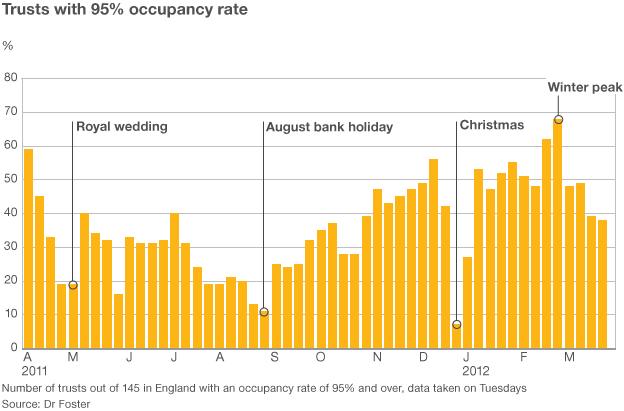Full hospitals creating potential danger, analysis says
- Published
- comments
Dan Poulter Health Minister said the NHS needs to prevent "people who don't need to be in hospital from being there in the first place".
Hospitals are "full to bursting" in England, creating a potentially dangerous environment for patients, an analysis by experts suggests.
Hospitals should run at about 85% capacity to give them room to cope with surges in demand, and figures show the NHS average hovering around that mark.
But analysts Dr Foster said the figure was skewed by quiet periods and rose higher if they were stripped out.
Ministers denied the NHS is overcrowded and said it could manage demand peaks.
According to the analysis, if only midweek figures are taken into account, the average capacity figure for 2011-12 was 88%.
It rose to 90% if holiday periods, such as the royal wedding and Christmas, were stripped out, Dr Foster said.
The private research group said this was important as the quiet periods were helping to mask the fact that many trusts were now too full for long periods of the year.
Its report, which excluded specialist centres but included 145 hospital trusts, said when hospitals were too busy patient care suffered because systems started breaking down.
Dr Foster co-founder Roger Taylor said: "When that happens, patients are put in whatever bed can be found, orderly management of admission and discharge can become strained, infections are harder to control and mistakes are more likely to happen."

But the analysis argued that if the NHS organised itself better it could relieve the pressure on hospitals.
From its analysis, Dr Foster said 29% of beds were taken up by patients who did not necessarily need to be there.
These included more than 10% who had conditions such as asthma and heart disease, which could be treated in the community, it said.
Another 5% were readmissions within a week or discharge, while 2.5% were for dementia.
'Real strain'
Patients Association chief executive Katherine Murphy said: "These distressing figures reveal bed occupancy rates are at the very limit of what is safe or indeed desirable for patients.
"Our helpline hears day in day out from patients and relatives who are experiencing unacceptably poor care, with nursing staff telling relatives that they simply do not have time to deliver the fundamentals of good care or dignity."
Dr Andrew Goddard, director of the Royal College of Physicians' Medical Workforce Unit, said: "The staggeringly high bed occupancy rates show that hospitals are at bursting point.
"The medical profession now must carefully consider these findings and decide how to improve hospital services to better meet the needs of patients."
Mike Farrar, chief executive of the NHS Confederation, which represents hospitals, said: "The big message at the heart of this report is that hospitals are under real strain and patients will suffer unless we are able to take swift action."
Dr Mike Williams says 'mistakes' are more likely from overworked NHS staff
He added the solution lay in investing in community services to take the strain off hospitals.
Dr Foster's study also included data on death rates. It uses four different measures, including deaths after surgery and among those with low-risk conditions, to help assess which hospitals are falling outside of what would be expected.
A total of 12 trusts - down on last year's more than 20 - were flagged up as performing worse than expected on two of the four measures.
This does not mean services are performing poorly, but instead the findings act as more of a "smoke alarm", suggesting something could be going wrong.
Health Secretary Jeremy Hunt said local managers in those areas should investigate.
On bed occupancy, he said: "The NHS is not overcrowded - on average, there are around 20,000 of its beds available. Of course this goes up and down, but the NHS has practice and experience in managing peaks in demand, particularly in the winter."
But Dr Foster medical guide editor, Alex Kafetz, said that figure was only an average and the number of patients using beds was "not particularly smooth" and more needed to be done to make sure patients who potentially should not be in hospital were cared for at home or at specialised care facilities.
Health minister Dr Dan Poulter agreed this was key, adding: "That is exactly why the government has embarked on a programme of reforming the NHS to make sure more of the budgets and money is held in the community and people can be better looked after and supported in their own homes.
Panorama will be covering more of the Dr Foster report in How Safe is Your Hospital? on Monday, 3 December at 20:30 GMT on BBC One.
- Published3 December 2012
- Published3 December 2012
- Published23 November 2012
- Published22 November 2012
- Published22 November 2012
- Published9 November 2012